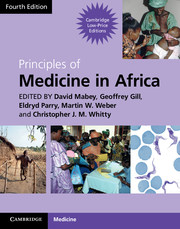Book contents
- Frontmatter
- Contents
- Contributors
- Foreword
- Section 1 Health and disease
- Section 2 Mother and child health
- Section 3 Infection: general principles
- Section 4 Major common infections
- Section 5 Bacterial infections
- Section 6 Viral Infections
- Section 7 Protozoal infections
- Section 8 Helminth infections
- 46 Intestinal helminths
- 47 Schistosomiasis
- 48 Lymphatic filariasis and loa loa
- 49 Onchocerciasis
- 50 Cysticercosis
- 51 Hydatid disease
- 52 Paragonimiasis
- 53 Trichinellosis
- 54 Guinea worm
- Section 9 Fungal infections
- Section 10 Non-communicable diseases
- Section 11 Diseases of body systems
- Section 12 Cancer and Palliative Care
- Section 13 Venoms and Poisons
- Index
- References
53 - Trichinellosis
from Section 8 - Helminth infections
Published online by Cambridge University Press: 05 March 2013
- Frontmatter
- Contents
- Contributors
- Foreword
- Section 1 Health and disease
- Section 2 Mother and child health
- Section 3 Infection: general principles
- Section 4 Major common infections
- Section 5 Bacterial infections
- Section 6 Viral Infections
- Section 7 Protozoal infections
- Section 8 Helminth infections
- 46 Intestinal helminths
- 47 Schistosomiasis
- 48 Lymphatic filariasis and loa loa
- 49 Onchocerciasis
- 50 Cysticercosis
- 51 Hydatid disease
- 52 Paragonimiasis
- 53 Trichinellosis
- 54 Guinea worm
- Section 9 Fungal infections
- Section 10 Non-communicable diseases
- Section 11 Diseases of body systems
- Section 12 Cancer and Palliative Care
- Section 13 Venoms and Poisons
- Index
- References
Summary
Trichinellosis results from ingesting raw or under-cooked meat infected with Trichinella species nematode worms. It is characterized by fever, diarrhoea, peri-orbital oedema, myositis and eosinophilia.
The problem in Africa
Human trichinellosis is uncommon in Africa. Most reported cases have occurred as a result of eating domestic pig, warthog and wild boar (Pozio, 2007). Outbreaks have occurred in Kenya, Tanzania and Ethiopia; and particularly in predominantly Muslim African countries (Gottstein et al., 2009). Trichinella infection is common in wild and farmed animals across the continent, and has been isolated from exotics such as farmed ostrich and crocodile. Human disease typically occurs in localized outbreaks.
Life-cycle and pathology
Cysts of Trichinella species are ingested in under-cooked infected meat, and larvae are released on gastric digestion. These embed in the duodenal mucosa and develop into adult worms; females release hundreds of larvae within 5–7 days of infection.
Larvae are carried in the bloodstream and lymphatics to skeletal muscles, where they penetrate striated muscle cells. Larvae may survive in humans for up to 40 years, and cyst calcification may occur after 6 months (Gottstein et al., 2009).
- Type
- Chapter
- Information
- Principles of Medicine in Africa , pp. 475 - 476Publisher: Cambridge University PressPrint publication year: 2013



